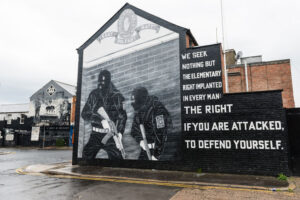Written by Scott Wilson

Part of your role as a leader is to cultivate leadership potential and encourage initiative in your team members. The price of that kind of initiative, though, can sometimes be disagreement.
Sometimes it seems like everyone wants to be the leader. In fact, it’s something that most approaches to organizational leadership encourage. But this has the potential to create a situation where staff begin to lead in different directions; and when that happens, conflict is inevitable.
And when conflict rises, guess how many people aren’t interested in being the leader anymore?
It’s not the part of leadership that shows up in the brochures. But the path to the top of any organization or industry is going to be lined with its share of rocks and mud-pits.
If everyone were in perfect agreement all the time, leaders wouldn’t even be necessary.
This makes conflict resolution and mediation skills a vital part of being a successful leader. The hard decisions are going to end up on your desk, and you’ll need to be equipped to make them judiciously and with sensitivity and empathy for all involved.
Leadership Is Defined by the Hard Calls You Have To Make
 Many leaders find out they have what it takes to be a leader in the first place by uncovering a natural talent for resolving conflicts. If you’re the person in the office that everyone turns to when there is some unreconcilable disagreement, pretty soon you’ll find you have the final say in a lot of different things. That’s pretty much the definition of a manager, if not a complete organizational leader just yet.
Many leaders find out they have what it takes to be a leader in the first place by uncovering a natural talent for resolving conflicts. If you’re the person in the office that everyone turns to when there is some unreconcilable disagreement, pretty soon you’ll find you have the final say in a lot of different things. That’s pretty much the definition of a manager, if not a complete organizational leader just yet.
But it’s clear in every workplace that someone has to call those shots. It’s one of the duties that falls to those with the authority and the responsibility to handle it.
When Conflict Resolution and Mediation Skills Save Lives
 Most leaders fortunately never have to resolve conflicts where lives are on the line. But in some fields, that’s all part of the job. And any aspiring leader can learn from high-stakes negotiations that successfully resolve some of the thorniest disputes in history.
Most leaders fortunately never have to resolve conflicts where lives are on the line. But in some fields, that’s all part of the job. And any aspiring leader can learn from high-stakes negotiations that successfully resolve some of the thorniest disputes in history.
The Troubles in Northern Ireland were definitely among those. Rooted in ancient history, the modern outbreak of violence and fear had prevailed since the 1960s by the time U.S. Special Envoy George Mitchell got involved.
Many other negotiators had tried to bring lasting peace, but all had failed. Mitchell soon established what he called the “Mitchell Principles” to mediation, which set preconditions to the negotiations to get all the parties to the table. He also pioneered methods to allow partial agreement to bring seemingly intractable parties at least somewhat into the fold.
But on Good Friday, 1998, he had successfully brokered a deal not just between the British and Irish governments, but also among most of the political parties of Northern Ireland.
That deal set out relationships and compromises between all parties that have been in place for more than a generation. The ceasefire there has largely held ever since.
Like any kind of leadership skill, though, conflict resolution can be done well or poorly. Just making a call doesn’t make it the right one. Just making the right call doesn’t even mean it will be accepted by everyone.
Skills in mediation and conflict resolution are the ones that help you help all the involved parties in getting to an agreement that is both effective and acceptable to all.
Finding the Skillset To Mediate and Resolve Conflicts in Any Organization
 Although some people are just natural peacemakers, for most it’s a skill that has to be learned. And it’s not just one, but a set of interrelated qualities and techniques that you can put to use fixing the disputes that come across your desk.
Although some people are just natural peacemakers, for most it’s a skill that has to be learned. And it’s not just one, but a set of interrelated qualities and techniques that you can put to use fixing the disputes that come across your desk.
The specific skills that make for a good negotiator and mediator are pretty closely tied to leadership qualities in general. They include:
Empathy and understanding -
Getting to agreement means first understanding where everyone is coming from. Your ability to put yourself in the shoes of the people in conflict is a necessary first step.
Strategic communication -
Communication skills aren’t uncommon, and clear communication is useful in conflict resolution. But strategic communication is even better—the tact and verbal judo skills needed to talk people around to your way of thinking is invaluable.
Vision and strategic planning -
Another clear advantage to mediators is the ability to see the big picture while those squabbling are looking only at pieces. Tying it all together in a way they can understand it can sometimes make problems go away without even having to do anything further
And like other leadership skills, these are all things that can be learned with the right degree or certificate program.
Finding Organizational Leadership Degree and Certificate Programs to Hone Your Mediation and Conflict Resolution Skills
 All organizational leadership programs include some sort of coursework in conflict resolution. Genuine high-end mediation training may be available in electives in some cases.
All organizational leadership programs include some sort of coursework in conflict resolution. Genuine high-end mediation training may be available in electives in some cases.
But there are also degrees and certifications that really focus on the leadership applications of mediation and conflict resolution. These may be particularly useful in certain contentious work environments, or even if you are interested in becoming the go-to person in your organization for resolving any kind of dispute.
Because the biggest stakes in conflict resolution usually come up at the highest levels of business, you’ll find that those education programs are mostly aimed at senior leaders who have already earned a bachelor’s degree and usually have several years of experience under their belt.
That means graduate-level coursework, in degrees such as a Master of Arts in Leadership and Workplace Conflict Resolution or a MSOL (Master of Science in Organizational Leadership) with a concentration in Mediation and Conflict Resolution. The MSL, or Master of Science in Leadership, with an Influence and Conflict Management Concentration offers similar training.
Because conflict resolution in business settings often has high dollar values attached, it’s also quite common to find leadership-oriented Master of Business Administration (MBA) degrees that are focused on this skillset, such as the Master of Business Administration in Mediation and Dispute Resolution.
Finding Your Focus in Mediation Through Dedicated Degrees or Certificate Programs
 It’s also important to recognize the difference between programs that teach mediation and conflict resolution for leaders and those that are structured specifically for mediation professionals. Many mediators work independently of any leadership role. While some of the techniques and approaches they use are identical to leaders performing the same task, the leadership context makes for a very different kind of training.
It’s also important to recognize the difference between programs that teach mediation and conflict resolution for leaders and those that are structured specifically for mediation professionals. Many mediators work independently of any leadership role. While some of the techniques and approaches they use are identical to leaders performing the same task, the leadership context makes for a very different kind of training.
You can, however, find colleges that offer dual-degree programs that combine a conventional MSOL/MAOL with a degree such as a Master of Science in Negotiation and Conflict Resolution, or an MS in Conflict and Mediation. It’s also common to find MBA programs with dual degree options in this area, so you could stack an MBA with an organizational leadership focus together with a Master’s in Conflict and Mediation. These offer a powerful double-barrel of leadership and conflict resolution skills that can equip you to work smoothly in the most contentious environments.
Another exception to the rule may be when it comes to certificates in mediation and conflict resolution. Certificates are relatively short, highly-focused courses of study that save time by cutting out everything that’s not in the core curriculum of the subject. So if you’re already an experienced, well-trained leader who only needs to brush up on negotiation, mediation, and conflict resolution skills, a dedicated certificate can do the trick.
You’ll find certificate programs available at all levels of expertise, so you can easily match one to your level of education, whether graduate or post-graduate. Typical certificate programs include a Graduate Certificate in Conflict Resolution, a Conflict and Dispute Resolution Certificate in Industrial and Organizational Mediation, or a Communication Leadership and Conflict Management Certificate.
Some certificates are even more specialized by industry or field and may offer more to leaders in those areas. Examples include Certificates in Clinical Conflict Management for medical professionals, or a Conflict Management and Dispute Resolution Certification from a law school.
Some professions take conflict resolution to an even higher level of education, like the Doctor of Education in Organizational Leadership, Conflict Management specialization degree. Doctoral studies in the field are uncommon outside of education, but because so many education professionals have advanced degrees already, it opens up the field of study to the most senior leaders.
Online Organizational Leadership Programs Resolve the Conflicts Between College and Your Life
 By the time you get to the point where you are looking at advanced studies in mediation and conflict resolution in your leadership career, you probably already have a healthy set of professional obligations staked out in your day job. You may have a family started and other local ties and obligations.
By the time you get to the point where you are looking at advanced studies in mediation and conflict resolution in your leadership career, you probably already have a healthy set of professional obligations staked out in your day job. You may have a family started and other local ties and obligations.
All that can make it tough to pick up and relocate halfway across the country to attend a master’s program in OL mediation and conflict resolution. You may not even have enough free time for a traditional certificate program!
Fortunately, many of these programs are available today in online or hybrid formats as well as the traditional on-campus design.
Remote studies open up your options among all the different programs nationwide. You don’t have to choose between something local but mediocre or dropping everything to attend the perfect program three states away.
They offer similar freedom in your day-to-day studies. Rather than having to block off specific times each day to attend class, most online programs allow you to study asynchronously—fitting in your coursework whenever and wherever makes the most sense to you.
If you need to catch a video lecture on the subway on the way to work, that’s no problem. Finish the latest assignment up while dinner is cooking that same night. And catch up on group chat with other members of your class to talk it all over while you’re sitting in bed. The coursework is just as challenging but fitting it in to your already-busy life gets a lot easier with online studies.
How Mediation and Conflict Resolution Skills Are Taught to Leaders
 The typical course of study in organizational leadership training will go a long way to developing your conflict resolution instincts. Right out of the box, these degrees foster qualities like vision and empathy that are essential in damping down disputes. And they also come with training in areas such as organizational assessment, which help you monitor and surface conflicts among your team before they ever become particularly poisonous.
The typical course of study in organizational leadership training will go a long way to developing your conflict resolution instincts. Right out of the box, these degrees foster qualities like vision and empathy that are essential in damping down disputes. And they also come with training in areas such as organizational assessment, which help you monitor and surface conflicts among your team before they ever become particularly poisonous.
But conflict resolution and mediation concentrations offer a separate, more in-depth set of courses to hone your dispute resolution skills. Those classes include:
Decision-making Processes
At the root of conflict resolution is the ability of the resolving leader to make a decision that is seen as fair, reasonable, and at least in some measure correct. All the negotiating skills in the world can’t make up for bad decision-making skills. So conflict resolution and mediation studies usually include coursework that teaches how to evaluate competing ideas and to use modern decision-making models to determine the best possible option among them.
Conflict Management Systems Design
One of the best ways for leaders to deal with conflicts is to avoid them in the first place. This isn’t available to most mediators, but for business leaders, understanding how to develop organizational processes and structures that damp down conflict and encourage early alignment and self-resolution to potential conflicts is solid gold. You’ll study the elements of systems needed to develop organizational culture and behaviors that keep conflicts from ever rising to your level.
Mediation and Negotiation
Although mediation and negotiation are really different positions for a leader to be in, the skills and techniques used are very similar in both. These courses will take you through essential concepts like developing a BATNA, or Best Alternative to a Negotiated Agreement, or MESOs, Multiple Equivalent Simultaneous Offers, to improve your understanding of tactics and the negotiation process no matter where you are sitting at the table.
Ethical Considerations in Conflict Resolution
Leaders have to meet the highest ethical standards, so ethics courses are common in OL degrees. But there are different theoretical frameworks of ethics and judgement that apply in dispute resolution, and courses like this help you understand them with studies of judicial systems, social and cultural aspects of fairness, and the psychological underpinnings of perception.
One of the invaluable aspects of getting a formal education in this area is the opportunity to see master practitioners at work. Master’s programs in particular often offer projects in conflict resolution or internships that place you in real-world settings where current leaders demonstrate what it takes to get to yes with a wide range of conflicting circumstances.
Mediation and conflict resolution skill training is an investment that can pay off in every aspect of your life, both on the job and away from it.
Developing a deep expertise in mediation and conflict resolution is certainly a boost for your leadership skills. But it’s a mistake to think of the education only in terms of your profession. Life comes with all kinds of conflicts in all arenas. Whether it’s you dealing with a problematic neighbor directly or refereeing fights between your kids, understanding how to resolve those disputes can bring you a lot of peace and success away from work as well.




